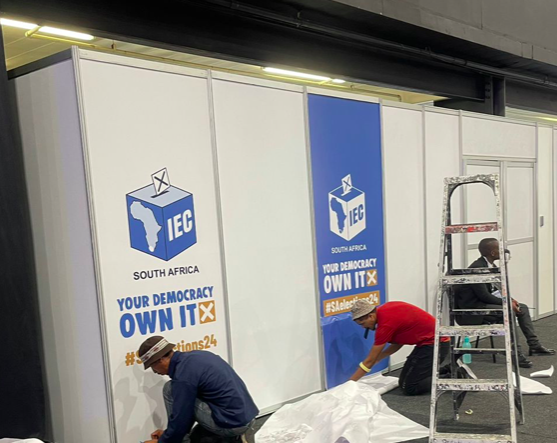Johannesburg – Early voting got under way in South Africa on Monday, kick-starting an election week that could mark a sea change in the country’s politics, with the ruling African National Congress’ majority on the line for the first time.
More than 600,000 of the elderly and infirm, along with essential workers, police and prisoners, deemed unable to come to the polls on Wednesday were allowed to vote first.
Philemon Makweng, a 62-year-old retiree wrapped up in a hat and sweater against the cool winter weather, has voted in every election since 1994, but was pleased for the chance to turn out early this year.
“I am avoiding the queues of those youngsters who are coming on Wednesday, they push us,” he told AFP, casting his ballot in Yeoville – a crime-prone area in Johannesburg’s hardscrabble central business district.
In a nearby building, election officials backed by two police officers climbed three floors to reach 65-year-old pensioner Thelma Dingaan.
“If they didn’t come early, I would not have voted. I was ready to leave for the clinic,” she said, glancing at her swollen feet. “I am happy to see we have been taken seriously and respectfully as senior citizens.”
Winning streak
The rest of South Africa’s 27-million-strong registered electorate will be called on Wednesday, and opinion polls point to the ANC falling under 50 percent for the first time in 30 years of democracy.
If left with no absolute majority in the 400-seat National Assembly, President Cyril Ramaphosa will have to negotiate support from other parties to return to power.
Full results are not expected before the weekend.
“The ANC is under enormous pressure,” Steven Gruzd, a political analyst at the South African Institute of International Affairs (SAIIA), told AFP.
“It achieved 57 percent in the last national elections but all the opinion polls say that it will drop considerably — and most of them say below 50 percent.”
Voting stations have experienced a slow start and somewhat lower turnout as South Africans, who registered for special votes, are heading to the polls on Monday and Tuesday. #DailyWrap #Newzroom405#27May2024 pic.twitter.com/QUKa4Y5ekD
— Newzroom Afrika (@Newzroom405) May 27, 2024
Under South Africa’s post-apartheid constitution, MPs are elected on a party list system, and the executive president is chosen from among their number by the Cape Town-based parliament.
If the ANC has fewer than 201 seats, Ramaphosa would have to negotiate with opposition parties and independent MPs to secure a majority and return to government headquarters in Pretoria.
After three decades in power as the lead party of the anti-apartheid struggle, the ANC finds its record under attack.
Criticised for soaring crime and unemployment, accused of overseeing corruption and rolling power cuts, Ramaphosa’s government is beset by both the liberal right and the radical left.
The centre-right Democratic Alliance (DA) has vowed to “Rescue South Africa” by rolling back the ANC’s race-based economic empowerment programmes and to boost growth through privatisation and deregulation.
From the left, he faces two groups that split from the ruling party, former president Jacob Zuma’s uMkhonto weSizwe (MK) and former ANC youth leader Julius Malema’s Economic Freedom Fighters (EFF).
Crime and poverty
Turnout could prove key, with some models suggesting a low participation might favour the ruling party.
Voter numbers have progressively shrunk every five years, since hitting a high of 89 percent in 1999. Turnout at the last elections in 2019 was 66 percent.
“It is unsurprising then that voter turnout has been steadily declining. This is due neither to apathy nor disinterest, but is directly a function of discontent and the declining trust in representative institutions of public deliberation,” said analyst Ebrahim Fakir.
Some analysts predict that the ANC will shore up its numbers patching up differences with one or both of the MK and EFF, while others – like Gruzd – expect an alliance with a group of smaller parties.
There are 52 political groups in total on the national ballot that could in theory contribute seats to a new narrow majority.
This would be a historic evolution in the country’s democratic journey, and many South Africans turning out for Monday’s advance voting seemed hungry for change.
Lulama Mayeki, 59, will work as an impartial election clerk on Wednesday, so she came out on Monday to perform her own civic duty, telling AFP that it was the first time she had changed party.
“Hopefully they will bring a big change,” she said, without saying who she would vote for now. “I trust that they will fight crime, poverty, overcrowding.”
Follow African Insider on Facebook, Twitter and Instagram
Source: AFP
Picture: X/@IECSouthAfrica
For more African news, visit Africaninsider.com


